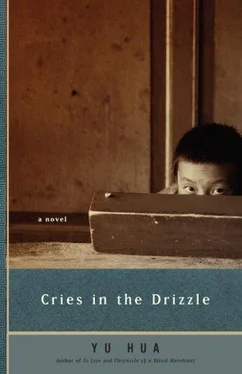When this vulgar woman opened her mouth, somehow she projected power. She told them to leave just as arrogantly as her sons had told us to clear off. For just a moment the eight urbanites were silenced, and then they all burst into frantic protest. Liu Xiaoqing and I could not make any sense of what was said: with so many people talking at once, the hubbub that reached our ears was just a wall of sound. Then Guoqing's father spoke up, just as we were becoming convinced he wasn't there. He yelled angrily at the eight uncles and aunts: “Why are you all shouting? How irresponsible can you be? With you all making so much noise, how am I going to live this down?”
“Who's being irresponsible?” A quarrel erupted, as loud as a house falling down, and it sounded as though several men wanted to beat Guoqing's father and several women were trying desperately to stop them. Guoqing's mother's brothers and sisters were reduced to a state of helpless indignation, for after they had exhausted themselves explaining the rights and wrongs of the case, the obstinacy of the newlyweds made them suddenly realize that it was impossible to have a serious discussion with them. The oldest brother, the most senior figure of the eight, decided against leaving Guoqing in the newlyweds’ care. He said to Guoqing's father, “Even if you wanted to raise him, we would absolutely refuse to let you. A man like you is just a beast!”
As the eight visitors came out the door, we heard a tumultuous expulsion of breaths. A traumatized Guoqing walked in the middle of the group, looking uncertainly at Liu Xiaoqing and me. I heard one of the men say, “How could Sis have married someone like that?” He was so exasperated that he had begun to think the fault lay with Guoqing's deceased mother.
The uncles and aunts assumed the responsibility of supporting Guoqing, and from then on they each sent Guoqing two yuan monthly. The forest green post office became the conduit for Guoqing's wealth. Several times each month he would announce to us proudly, “I have to go to the post office today.”
When Guoqing began to receive his sixteen yuan for living expenses, I was to enter the most extravagant phase of my whole childhood, and the same was true for Liu Xiaoqing and a few other classmates. We stuck close to Guoqing, who often hankered for candy and olives. He was a generous boy, sharing with us the same pleasures that he allowed himself. He squandered his limited fortune as recklessly as a rich man's son, and on our way to school every morning we secretly looked forward to his big spending. The result was that by the second half of that month Guoqing was flat broke, and he was forced to depend on our charity to stave off hunger. But none of us could throw money around as freely as he, and we began to pilfer things from our homes: a handful of steamed rice, a piece of fish, a chunk of meat, some bits of vegetable, wrapped up in dirty paper and presented to him. Guoqing would open up the packages and spread them out on his knee, then eat their contents with gusto. He would smack his lips so loudly that even we who had already had a full meal found our mouths watering. This situation did not last very long, for soon our teacher, Zhang Qinghai the knitter, made himself responsible for managing Guoqing's living expenses and gave him only fifty cents a month as pocket money. That still left him the most affluent of any of us.
After his abandonment Guoqing gradually got used to handling his own affairs. But he never truly reconciled himself to his father's departure, and he did not follow his father's lead and repudiate him in turn. On the contrary, his father continued to exert control over his thinking. Our teacher tended to forget about the change in Guoqing's circumstances, and he would still sometimes threaten to inform Guoqing's father as a way of cowing him into submission whenever he did something out of line. It seemed never to occur to Guoqing that he was now free as a bird, that his anxiety was quite unnecessary. In his mind his father seemed still to be always watching him, and he was naive enough to be unsettled by the possibility that the man might appear in front of him at any moment. In fact, if his father did show up, it was only in a chance encounter. The man's standoffish attitude demonstrated that he had no plans at all to drop in on Guoqing.
I remember that the three of us were once standing on the side of the road, throwing pebbles at the streetlamps. It was Guoqing's idea, but we were all gung-ho, each hoping we would be the one to smash a light. When an adult came over to intervene, Liu Xiaoqing and I took to our heels, but Guoqing didn't budge an inch. He stood his ground and said defiantly, “Hey, it's not your light.”
Just at that moment Guoqing's father appeared. Guoqing's nerve failed him; he went over, quaking, and called, “Hi, Dad.”
He tried to clear himself of any suspicion of wrongdoing, insisting that he wasn't involved, and he even went so far as to defect completely from our camp, pointing at Liu Xiaoqing and me and saying, “They're the ones doing it.”
But Guoqing's father said heatedly, “Who are you calling Dad?”
For him to forgo the right to punish his son was a much bigger blow to Guoqing than his refusal to look after him. How pitiful Guoqing now looked: when he crossed the street we saw that he had bitten his lip in a desperate effort to hold back the tears that were all ready to flow.
Even after this he still insisted that he would wake up one morning and find his father at his bedside. Once he told me with great conviction that when his father got ill he would “come and find me.” He asked me to confirm that his father sought his help whenever he was ill; again and again he would say, “You saw that, right? You saw it.” He no longer dipped into his little cardboard box, and even if he had a bad cough he wouldn't open one of his vials. Somehow he believed that as long as there was medicine in the pillboxes sooner or later his father would return.
Now when he talked about his mother, the past, though still remote, no longer seemed so hazy. He often used the expression “in those days”: in those days, when his mother was alive, how good things were. He never gave us specifics of his happy life then, but heaved plenty of wistful sighs, making us wildly envious of “those days.” He began to conjure up images of his mother; the imagination of this boy of nine was not focused on the future, but was connected — unusually for someone so young — to the past.
When we were small, we were fascinated by the horse on packs of Flying Horse cigarettes. The flatlands where we lived were traversed only by cows; the few sheep we glimpsed were always shut up inside pens. There were pigs, of course, but they left us cold. It was the white flying horses that we adored, for none of us had ever seen a horse. Later an army detachment came to Littlemarsh, and a horse-drawn carriage cut through the town in the early hours and rolled onto the high school grounds.
At the end of school that morning the three of us dashed toward the high school, waving our satchels. Guoqing ran ahead, spreading his arms wide like a huge bird. But it soon became apparent that I had misinterpreted his gesture, for he cried, “Hey, I'm a flying horse!” As Liu Xiaoqing and I ran behind, we followed his lead excitedly.
We were now a trio of flying horses, neighing with spirit and flying over the department store, the theater, and the hospital. But after sailing over this last building Guoqing let his arms drop to his sides, as though he had been shot; his ride was cut short. Looking miserable, he headed back in the direction from which we had come, hugging the wall. He did not say a word to us, and as we had no clue what had happened we chased after him seeking an explanation. But he just kept going, and when we tried to stop him he angrily pushed us aside and said with a sob, “Leave me alone.”
Читать дальше












